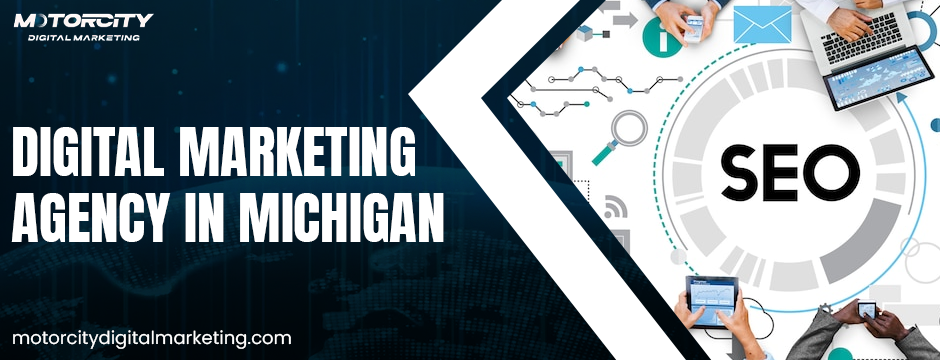Today Michigan businesses have more advertising options than ever before. Yet, countless local companies still struggle to make their ad dollars count. Whether you run a small coffee shop in Ann Arbor, a family-run construction firm in Grand Rapids, or a boutique in Detroit, chances are you’ve poured money into digital ads that didn’t deliver real returns. Partnering with an experienced digital marketing agency in Michigan can make all the difference. The problem isn’t always the platform—it’s the strategy behind it.
A well-executed PPC (Pay-Per-Click) campaign can transform how your business connects with customers. But if it’s not planned, tracked, or optimized correctly, your budget can vanish without meaningful impact. Let’s look at why local Michigan companies waste ad spend and how a smarter PPC strategy can fix it.

1. The Misconception: “More Clicks Mean More Sales”
One of the biggest misconceptions among small businesses is that a high number of clicks automatically leads to conversions. Unfortunately, that’s rarely true. PPC campaigns are designed to attract attention, but attention alone doesn’t pay the bills.
When you focus only on clicks, you may attract users who aren’t genuinely interested in your product or service. For instance, a local Italian restaurant in Detroit might target “best restaurants near me” without narrowing it down to users looking for authentic Italian cuisine. As a result, they’ll end up paying for irrelevant clicks that don’t convert.
To make PPC effective, you must look beyond clicks. Metrics such as cost per acquisition (CPA), return on ad spend (ROAS), and conversion rate tell the real story. A campaign that brings in 100 qualified leads is far more valuable than one that brings in 1,000 random clicks.
2. Poor Targeting and Generic Campaigns
Another major reason local businesses waste ad spend is poor targeting. Many campaigns use generic ad groups and keywords that appeal to everyone—and therefore no one.
For example, a Detroit-based home renovation company might bid on keywords like “home improvement” or “best contractor.” These terms are too broad. They attract clicks from users in other states or people looking for DIY tips, not professional services.
The fix lies in geo-targeting and keyword specificity. Michigan businesses should tailor their campaigns to specific cities, neighbourhoods, and customer segments. Instead of “home improvement,” try “licensed home renovation experts in Troy, MI.” This change alone can significantly improve the quality of traffic while reducing costs.
A well-defined PPC campaign allows you to focus your budget where it matters—on people who are ready to take action.
3. Weak Ad Copy and Irrelevant Landing Pages
A great ad will get you clicks, but a poor landing page will kill conversions. Many Michigan businesses run beautifully designed ads that lead users to dull or irrelevant landing pages. It’s a disconnect that wastes valuable traffic.
Imagine someone searching for “digital marketing for Italian restaurants.” They click an ad that promises “Boost Your Restaurant’s Reservations with Targeted PPC,” but land on a generic homepage that doesn’t mention restaurants at all. The user quickly leaves, and the business pays for another wasted click.
The key to fixing this is message alignment. Your ad copy should match the content of your landing page word for word in intent and tone. If your ad promises “Free Consultation for Italian Restaurant Marketing,” the landing page must highlight exactly that. Consistent messaging improves credibility and conversion rates.
A well-optimized landing page should have:
- A clear headline that reflects the ad promise.
- A concise value proposition.
- A single, strong call-to-action (CTA).
- Fast loading speed and mobile compatibility.
4. Ignoring Negative Keywords
Negative keywords are one of the most overlooked elements of PPC campaigns. They help you exclude irrelevant searches that drain your budget.
Let’s say a Lansing-based digital marketing firm is running ads for “Digital Marketing Agency In Michigan.” Without negative keywords, their ads might appear for searches like “free digital marketing agencies” or “digital marketing jobs.” These clicks won’t bring in paying clients but will still cost money.
Adding negative keywords like “free,” “cheap,” “internship,” and “training” helps filter out unqualified traffic. This simple adjustment can cut wasted spend by 20–30% while improving the quality of leads.
It’s essential to review search term reports regularly. They reveal which queries triggered your ads and how users engaged. Removing low-value terms ensures your ads reach the right audience.
5. Neglecting Local Search Extensions
Local Michigan businesses often forget how powerful Google’s local extensions can be. Features like location extensions, call extensions, and local service ads make it easier for nearby customers to contact or visit your business.
For example, if someone searches “pizza near me” from Ann Arbor, a properly optimized ad with location and call extensions can appear at the top with a “Call Now” button and your address. This reduces friction between intent and action, leading to more direct sales.
Adding these local cues increases visibility and trust. Users prefer ads that show clear proximity and contact details because they feel more authentic and reliable.
6. Failing to Use Conversion Tracking
Many companies still run PPC campaigns without proper conversion tracking in place. They might know how many clicks they got, but not how many leads or sales came from those clicks. That’s like driving a car without a dashboard—you’re moving but have no idea how fast or in which direction.
Conversion tracking allows you to see which keywords, ads, and audiences actually produce results. It helps you optimize campaigns based on real data rather than assumptions.
For instance, if you run a campaign for “Digital Marketing For Italian Restaurants,” tracking will show which ad variation brings more reservations or phone calls. You can then increase the budget for high-performing ads and pause the weak ones.
Platforms like Google Ads and Meta Ads Manager offer detailed conversion insights, but they must be properly configured. Setting up form tracking, call tracking, and event tracking ensures you know exactly where your revenue is coming from.
7. Not Adjusting Bids and Budgets
Running the same bid across all keywords is another common mistake. Some keywords perform better, some worse—so why pay the same for both?
A smart PPC strategy involves continuous budget optimization. If a keyword generates consistent conversions at a low cost, increase its bid. If another keyword drains budget without conversions, reduce or pause it.
Michigan companies can also benefit from scheduling ads during peak hours. For example, an Italian restaurant might run ads between 4 PM and 9 PM when customers are looking for dinner options. A retail store may focus on weekends when people are shopping.
Using automated bidding strategies like “Maximize Conversions” or “Target CPA” can help balance efficiency and performance. But the key is to monitor results regularly and adjust manually where needed.
8. Forgetting About Mobile Users
Mobile traffic dominates online searches, yet many local businesses still design ads and landing pages primarily for desktop users. If your site takes too long to load or your form is too complex to fill out on a phone, you’re losing valuable leads.
For Michigan-based businesses, mobile optimization isn’t optional. Whether you’re promoting a new restaurant in Livonia or a salon in Dearborn, your customers are likely searching from their phones.
Ensure your ads have mobile-preferred versions, and your landing pages are mobile-friendly with simple CTAs like “Call Now” or “Get Directions.” Even a one-second improvement in page speed can increase conversions by up to 10%.
9. Overlooking Retargeting Campaigns
Many businesses treat PPC as a one-shot opportunity—they run ads, get clicks, and stop there. But not every visitor converts on the first interaction. Retargeting allows you to reconnect with users who showed interest but didn’t act.
A well-structured retargeting campaign reminds users about your offer through Google Display or social media ads. It can increase conversion rates by up to 70% because these audiences are already familiar with your brand.
For example, someone might visit a restaurant website after searching “Digital Marketing For Italian Restaurants,” browse the menu, but leave without booking. A retargeting ad offering “10% off your first dine-in experience” could bring them back.
Retargeting is one of the most cost-effective ways to reduce wasted ad spend and convert hesitant users.
10. Failing to Collaborate with Experts
Running PPC campaigns can be deceptively simple but managing them effectively requires skill, data interpretation, and time. Many Michigan business owners try to handle their digital marketing themselves, often with limited success.
A professional Digital Marketing Agency In Michigan brings strategy, experience, and constant optimization. Agencies monitor campaigns daily, test ad variations, adjust budgets, and analyze reports—tasks that small business owners rarely have time for.
Partnering with the right agency ensures your campaigns align with your business goals and deliver measurable returns. It’s not just about saving time—it’s about investing your money where it counts.
Motorcity Digital Marketing Agency: Your Local Growth Partner
At Motorcity Digital Marketing Agency, we understand the challenges Michigan businesses face in maximizing their ad budgets. As a trusted Digital Marketing Agency In Michigan, we work closely with clients to build campaigns that deliver real, measurable growth.
We don’t believe in generic templates or one-size-fits-all strategies. Instead, we create tailored PPC campaigns that target your ideal customers, whether you’re running a restaurant in Detroit or a construction firm in Southfield. Our team manages every aspect of your marketing—from keyword research and ad creation to tracking and optimization—so your dollars generate real results.
Our experience with diverse industries, including Digital Marketing For Italian Restaurants, has taught us that every business deserves a customized strategy that reflects its brand and local audience. When you work with us, you gain a partner committed to transparency, data-driven results, and sustainable growth.

Conclusion
PPC advertising can be one of the most powerful tools for local businesses—if done right. Unfortunately, many Michigan companies lose thousands of dollars each year due to poor targeting, weak landing pages, and lack of optimization. The key to success lies in understanding your audience, tracking your results, and continuously refining your strategy.
By avoiding the common pitfalls and adopting smarter PPC practices, you can stretch every advertising dollar and see tangible business growth. Whether you choose to manage your campaigns in-house or partner with a trusted Digital Marketing Agency In Michigan like Motorcity Digital Marketing Agency, the right approach will ensure your ad spend works harder and smarter for your business.
